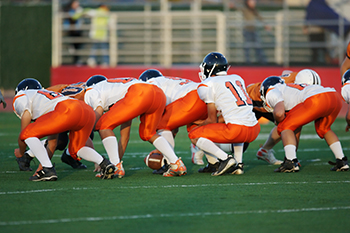Oceanside (760) 630-9200
Causes and Symptoms of Turf Toe
Tuesday, 28 February 2023 00:00
A condition commonly called turf toe is the result of overextending the big toe joint. It happens when the toe is pushed too far toward the top of the foot. Picture a football player raising the heel of his foot to push off the ground and burst forward when the quarterback throws the ball. This overextension of what is known as the metatarsophalangeal joint, or MTP, combined with the weight of the body, can easily sprain the joint. Symptoms of turf toe include pain and tenderness to the touch, swelling and bruising, limited range of motion, and loose joints. You may not be able to move the joint without causing pain, and bruising may extend into the foot. In more severe cases, it may become difficult to put any weight on the big toe. Treatment for turf toe may include the necessity of wearing a protective boot, which will help to keep the MTP joint from bending. Diagnosis is often done through an MRI to determine the severity of the injury. Recovery may take up to eight weeks, and in severe cases surgery may be involved. For information about turf toe and its treatment, it is suggested that you seek the expertise of a podiatrist.
Toe pain can disrupt your daily activities. If you have any concerns, contact Dr. Jeff Brooks of Oceanside Foot & Ankle Center. Our doctor can provide the care you need to keep you pain-free and on your feet.
What Causes Toe Pain?
Most severe toe pain is caused due to a sports injury, trauma from dropping something heavy on the toe, or bumping into something rigid. Other problems can develop over time for various reasons.
Toe pain can be caused by one or more ailments. The most common include:
- Trauma
- Sports injury
- Wearing shoes that are too tight
- Arthritis
- Gout
- Corns and calluses
- Hammertoe
- Bunions
- Blisters
- Ingrown toenails
- Sprains
- Fractures (broken bones)
- Dislocations
When to See a Podiatrist
- Severe pain
- Persistent pain that lasts more than a week
- Signs of infection
- Continued swelling
- Pain that prevents walking
Diagnosis
In many cases the cause of toe pain is obvious, but in others, a podiatrist may want to use more advanced methods to determine the problem. These can range from simple visual inspections and sensation tests to X-rays and MRI scans. Prior medical history, family medical history, and any recent physical traumatic events will all be taken into consideration for a proper diagnosis.
Treatment
Treatments for toe pain and injuries vary and may include shoe inserts, padding, taping, medicines, injections, and in some cases, surgery. If you believe that you have broken a toe, please see a podiatrist as soon as possible.
If you have any questions please feel free to contact our office located in Oceanside, CA . We offer the newest diagnostic tools and technology to treat your foot and ankle needs.





